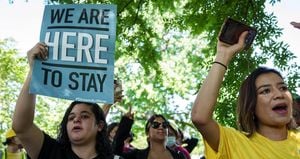India's caste system and representation are becoming central topics in political discussions, especially as the country approaches significant elections. Recently, Rahul Gandhi, the leader of the opposition party, promised to conduct a caste census if the Maharashtra Vikas Aghadi (MVA) assumes power. This announcement was made during his speech at the Maharashtra Swabhiman Sabha rally held in Nandurbar, where he emphasized the importance of accurately determining the number of scheduled tribes (ST), scheduled castes (SC), and other backward classes (OBC) within the state. He asserted, "The caste census will help ascertain the number of Adivasis, Dalits, and backward classes to provide them with fair representation. The underprivileged communities deserve their rightful place and voice within the political system." His comments resonate strongly with the public sentiment craving inclusivity and representation.
At the rally, attended by key MVA members including Congress Maharashtra's Ramesh Chennithala, Gandhi lambasted the ruling BJP for their alleged neglect of marginalized communities. He claimed, "The BJP has insulted OBCs and other marginalized groups by failing to give them proportional representation." His statements highlight the discontent among various communities who feel sidelined by current governance structures.
One of the focal points of Gandhi's critique was Prime Minister Narendra Modi's assertion about the Indian Constitution, which he called "blank pages." Gandhi expressed outrage, stating, "Prime Minister Modi says the constitution which I show you at rallies is blank pages. He feels this way because he has never read the constitution." He suggested this viewpoint diminishes the contributions of historical figures like Dr. B.R. Ambedkar, Mahatma Phule, and Birsa Munda, who fought for the rights of marginalized groups.
Gandhi's commitment to conducting the caste census aligns with broader calls for greater transparency and accountability within political discourse. The move proposes to dismantle barriers faced by marginalized communities by ensuring they have adequate representation and resources. The MVA aims to address systemic inequalities through this initiative, alongside other welfare measures.
Further, if the MVA returns to power, Gandhi pledged to abolish the existing 50% cap on reservations, potentially allowing even greater representation for marginalized communities. He rallied the crowd with promises of various welfare schemes for women and farmers, which reflect the party's approach to economic security and women’s empowerment. "Under the Mahalaxmi scheme, women will receive ₹3,000 monthly, and farmers will benefit from loan waivers up to ₹3 lakh. Everyone deserves health insurance and the MVA would implement ₹25 lakh health coverage for families," he proclaimed, hoping to instill hope and motivate the electorate.
The caste census debate has been rekindled following demands from several state governments and political leaders across party lines, arguing for the necessity of comprehensive data to inform social policies effectively. According to analysts, there is a growing recognition of the caste system’s impact on contemporary socio-political dynamics, signifying its relevance and urgency as elections draw closer.
With political discourse intensifying around issues of caste representation, the upcoming elections are expected to see major campaigns focusing on policies aimed at integrating former disadvantaged groups. Activists argue this could lead to significant changes within the legislative frameworks, pushing for more inclusive governance. Political observers have noted how caste dynamics play a pivotal role during election cycles, influencing voters' sentiments and party strategies.
The Caste Census, if successfully implemented, could act as both a tool for political empowerment and social justice. It promises to help understand the complex demographic data reflecting India's diverse population, which has been historically marginalized. Such insights could facilitate equitable distribution of resources and benefits, tailoring governance to meet the needs of all citizens, particularly those from backward communities.
Critics of the caste system suggest it perpetuates divisions within society, calling for reforms to shift focus away from caste identities to communal unity. The deep-rooted nature of caste disparities, they argue, emphasizes the need for broader, inclusive socio-economic frameworks rather than mere political representation.
The political salience of the caste census has sparked heated discussions across India, illustrating the broader need for policies addressing the historical injustices faced by marginalized groups. It has become apparent: the narrative of caste, representation, and the quest for equality is more than just electoral rhetoric; it’s central to India’s democratic fabric.
Rahul Gandhi's rally at the Maharashtra Swabhiman Sabha embodies this shift. By openly challenging the status quo and calling for genuine representation through caste assessment, he not only reinforces his party's political position but also resonates with many citizens seeking change. His remarks aim to unite those eager for progress, rejuvenate grassroots movements, and inspire voters to explore issues beyond party loyalty.
The stakes are high as the Maharashtra elections approach, with the future of caste representation and political policies hanging finely balanced. Adjustments to ideological approaches and community representation may redefine India's political scene—shaping it for generations to come.



